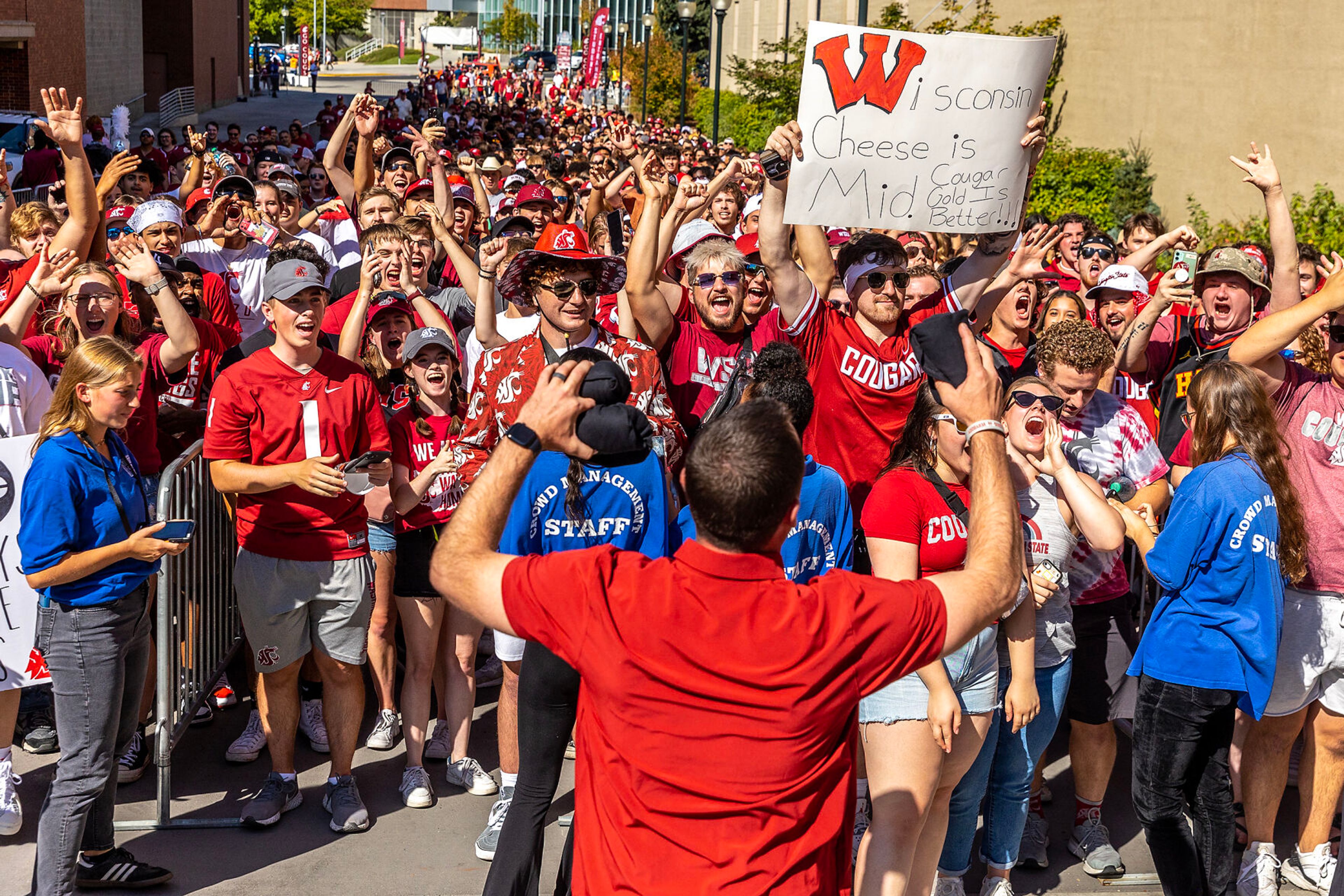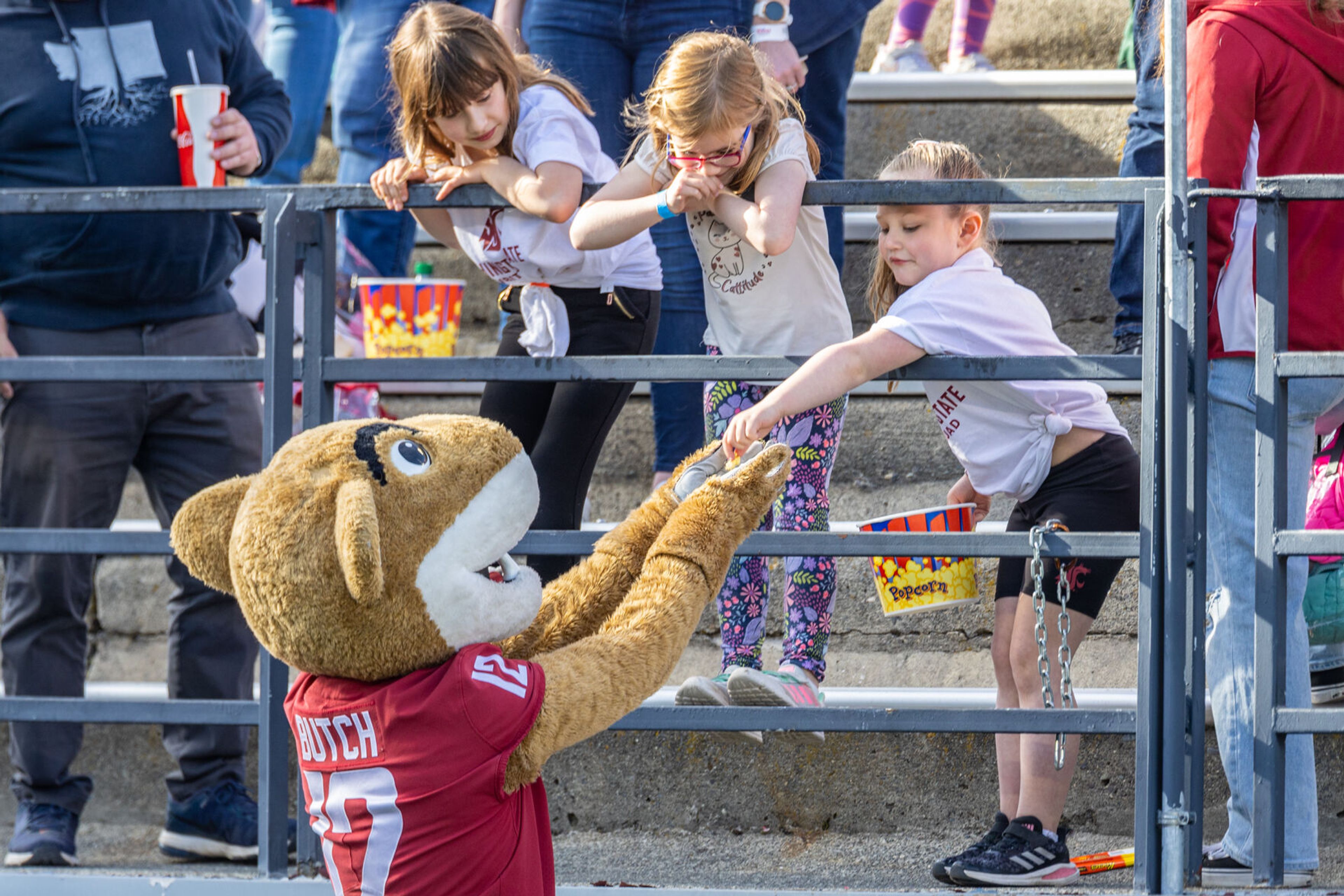TUESDAY MORNING QUARTERBACK: Care about the Cougs? Listen to Jake Dickert
‘If you’re pissed off … show up.’ Dickert implores WSU fans to attend games
If you told a Coug fan in 2020 that Mike Leach would be enshrined in the Washington State Athletics Hall of Fame during a September weekend in which his former program Texas Tech was in Pullman for the first time to face his other former program, WSU, they would have bet their life savings on the game being sold out.
Unfortunately for Wazzu, that hypothetical Coug fan would have lost everything. WSU was about 5,000 short of a sellout with 27,372 fans in the stands, per the official scorebook.
“I was very proud of what the attendance was, but at the end of the day, we didn’t sell out every seat,” WSU coach Jake Dickert said. “That is the goal, that is my marker, that is the expectation.”
The attendance was particularly underwhelming as it was the posthumous enshrinement of Leach into the WSU Hall of Fame following his tragic death in December 2022. An opportunity to honor a man critical to building WSU football into the modern brand that it is today.
Leach would hardly recognize the 2024 college football landscape, even though the changes were already in motion during his final season of 2022. Name, image and likeness (NIL) deals and the transfer portal have set the stage for major conference realignment, which sees Leach’s former Big 12 employer Oklahoma in the SEC with Texas and the Pac-12 a two-school league featuring just WSU and Oregon State, following the 10 other schools’ departures to other conferences (Big Ten, Big 12 and ACC).
Coug fans are bitter about this reality which has threatened the quality and stability of WSU’s athletic programs and cost real people real jobs in Pullman.
The single game driving the most apathy among Cougar fans is the first nonconference Apple Cup in over a century against rival Washington.
The rivalry game was a Thanksgiving weekend tradition while the two schools were Pac-12 foes, but it is now a September nonconference game at a “neutral” site — Lumen Field (home of the Seahawks) on Saturday in Seattle — about 15 minutes away from the home of the Huskies. WSU and UW agreed to a five-year series, with this year’s game at Lumen Field and the next four years alternating between Pullman and UW’s Husky Stadium.
As of last week, only a bit more than half of the stadium’s capactiy was sold for the Apple Cup.
“Whatever our best is as a fan base, it needs to happen this weekend,” Dickert said. “If you’re pissed off from what happened, show up, right? If you’re excited about it, show up. Whatever happens, show up. Be there, be loud and show what our best is as Cougs. That’s all I ask and hopefully, just like from our football players, we’ll deliver every chance we get.”
It’s safe to say that Dickert does not interpret a boycott of the Apple Cup as support for his football team.
Coug fans have plenty of reasons to be angry given the circumstances surrounding the game, from UW’s role in destroying the Pac-12 (regardless of the business sense of the move to the Big Ten, which is a whole other debate), to the high ticket prices (lower bowl tickets are listed at over $300 through Ticketmaster with nosebleeds at about $100 as of Monday night). Add these facts up and you have a lot of empty seats for what is supposed to be the most important, or at least symbolic, game on the schedule for both programs.
However, it’s this lack of engagement that reinforces the national narrative about WSU and supports the reason that the Cougs did not get initially invited to a “Power Four” conference.
Some college football media decision makers believe that no one shows up, no one watches and no one cares about WSU, enough to justify the investment.
Defensive fans may point to the dismal attendance of former conference rivals Cal and Stanford. Both programs have been below average on the field recently (though both beat WSU last season) and have average attendance below 40,000 people per game the last couple of years. However, no program had more NFL draft picks in the Pac-12 Conference from 2012–2023 than Stanford and the Cardinal have boasted five Heisman Trophy finalists all-time.
Despite this rich history, college football is simply not a priority in silicon valley and the Cardinal continue to draw just about 75% capacity on a good day. Even their top billed Week 1 home game versus recent College Football Playoff team TCU drew just 36,026 people to their 50,000-plus capacity stadium, according to ESPN.
The main reason Stanford found its way to a Power Four conference and WSU did not is geography. Stanford is in the Bay Area, one of the most populous markets in the country. Even if people don’t show up to games, plenty of people tune in to watch the nerds play, especially when their college football history includes the likes of Andrew Luck, Christian McCaffrey and John Elway.
WSU has a compelling brand and successful alumni too, of course, and has become somewhat of a QB factory with names like Drew Bledsoe, Ryan Leaf and Gardner Minshew playing on the Palouse.
The quality and history of football at WSU is not the problem with the program’s lack of national respect. It’s a perceived lack of brand value, viewership and support.
The ’Ol Crimson flag has been on every single ESPN College Gameday show since 2003, making the show’s 2018 arrival in Pullman one of the most iconic days in WSU history.
The numbers show that WSU ranked high in viewership compared to other Pac-12 schools and had a niche audience, especially after dark when football on the Palouse is at its best and most obscure.
These talking points and truths have been pointed out by anybody who cares time and time again since the Pac-12’s implosion, but one thing has not changed: WSU football game attendance (and fan support of athletic events overall) has remained average.
It took fans until the final three games of the season to believe in the WSU men’s basketball team enough to show up, packing Beasley with 8,000 strong (9,000 for the final Pac-12 game versus UW) for the final three games of the 2024 season.
The WSU women’s basketball team has been a postseason participant each of the last four seasons, but continues to see less than stellar attendance from a seemingly uninterested and disengaged fanbase.
Soccer and volleyball crowds are usually great, but those respective venues seat about 3,000 or less and are easily sustained by an engaged student section and family friendly-driven community support.
Gesa Field at Martin Stadium is unique in that its max capacity (approximately 32,952) is almost the entire population of Pullman (approximately 34,000 people).
Football is the front door to the university, providing plenty of opportunities for alumni to return to campus, see old friends and relive the glory days.
The main problem with college football in Pullman is that traveling for a football weekend is so expensive. Hotels in Pullman raise prices to capitalize on the high demand, forcing fans to seek refuge in Moscow (eight miles away from Pullman), Lewiston or Clarkston (36 miles away) or even Spokane (75 miles away).
Since 2022, WSU has sold out four of the possible 15 home games in the Dickert era. Fans have shown up for heated rivalry games versus Oregon, Washington and Oregon State as well as a blue blood powerhouse like Wisconsin to open last season.
However, just because Saturday was not a sell out does not mean that Dickert has given up on Cougar faithful. In fact, it’s just the opposite.
“I just want to thank all the fans,” Dickert said. “They’re out here. They’re investing in our football program. It means a lot to this team. Means a lot to me, and I’m not going to sell that short, because you run out that tunnel and it gets loud on third down. That stuff’s really important.”
Saturday’s crowd certainly was not bad. Over 27,000 people can and did make a lot of noise and it led to WSU’s 37-16 domination of Texas Tech in which John Mateer ran for the most rushing yards in a game by a quarterback in school history and the defense racked up four takeaways, having all of the answers for a reeling Tech offense.
Saturday was the definition of a fun home football game and there are only four of them left this year in Pullman. For those who care about Cougar football, your team’s football coach invites you to go to a game.
“Investing in our football program, going forward, is going to be everything that we need to be about,” Dickert said. “Investment comes before winning. Winning doesn’t precede investment. I think that’s something we all need to understand. I’m so thankful for Cougs everywhere, and hopefully they’re proud.”
Taylor can be reached at 208-848-2268, staylor@lmtribune.com or on X (formerly Twitter) @Sam_C_Taylor.









